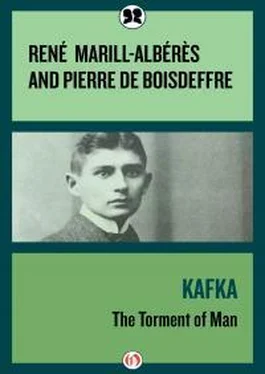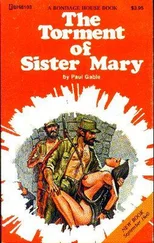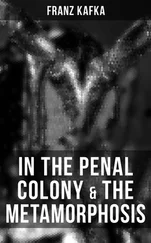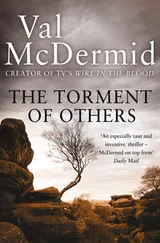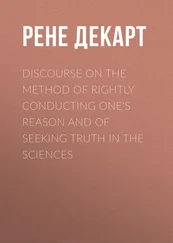Thus the most that we can do is to recall the sources and comparisons revealed by literary history or by the ingenuity and partiality of those who have examined these myths. Kafka’s witness, his friend Max Brod, sees the inaccessible castle as the mystery of God’s rule and divine grace; The Trial as a symbol of impenetrable divine justice. These interpretations are not false and seem to be almost too obvious; the only trouble is that they try to illuminate what Kafka sought deliberately to present as an insoluble enigma. But the themes of justice and divine grace are actually the themes of the Cabala, which Kafka had thoroughly assimilated.
When John Kelly interprets the two great Kafkan allegories as eschatological novels dealing with the relations between man and God, he adopts the same principle of interpretation as Max Brod. To this he joins an interesting comparison with the Calvinistic theologian Karl Barth: for Kafka as for Barth, human life cannot be a path to God; that is why it remains absurd and chaotic.
Man is not saved through his works; he must be “called,” elected, chosen, and the anguish of Kafkan heroes is the fear, the near certainty of not participating in this election. Practically unknown in France at the beginning of the twentieth century, Karl Barth was more renowned than Bergson in the Germanic countries (and surprisingly, in Spain). It is possible, therefore, that Kafka had read or studied him and been exposed to some degree to his influence. But this hypothetical source and this startling comparison do not justify the assertion that Kafka’s work is a deliberate expression of Calvinistic theology.
Many other interpretations, less spiritualistic but equally striking, have been advanced: the impression of malediction and absurdity that lies heavy on the heroes of the two novels could be the symbolic expression, by way of a refined, nervous sensibility, of the feeling of oppression caused by sickness and the death sentence which it entails. A socioeconomic interpretation also is possible: K. and Joseph K. wander and wrangle miserably in a bureaucratic world typified by middle-class society as it appears to a petty employee; Kafka has simply translated into hallucinatory terms the picture of the world’s insignificant bureaucrat. Finally, in the heroes who are invisibly persecuted in The Trial and The Castle , and treated as culprits even though no count of indictment has been produced—in these individuals who are subjected to vexations which they discuss but against which they seem to be unable to revolt—one can identify the Jew who dares not and cannot reclaim his rights, inured to arbitrariness, trying to adjust to his situation without causing an uproar, patiently exhausting details, resigned in the face of an unjust principle.
But those are only sources and comparisons: explanations which make the common mistake of purporting individually to be exclusive or primordial. Moreover, against this rationalism which requires one definitive explanation, art on the one hand and esoterism on the other—the very elements joined together in Kafka—have always set creations and myths which are governed by the principle that they mirror reality and may be explained in several different ways.
Thus the great Kafkan allegories are not interpretations of existence; they are the very images of existence.
The problem of the meaning of life cannot be said to have a solution. More exactly, and worse still, its meaning has never been stated precisely . There are insoluble equations; but there are also even more important instances of equations that cannot be stated.
Philosophers make the mistake of trying to formulate the equation which will enable them to discover the meaning of life, then they become less self-centered and realize that their equation has no roots. After Kierkegaard and the negative mystics, Kafka contributes something to philosophy and corrects it: he does not show that the problem is insoluble but only that it cannot be clearly stated. And that is in all probability the true subject of The Trial and The Castle .
This attitude, which might roughly be termed the “reduction to the absurd” of a problem that cannot be formulated, and which in Kafka assumes the artistic form—that is, a pathetic and nonphilosophical form—had existed in what was called “negative theology” which began with Origen, later found expression in Pseudo-Dionysius, then in Meister Eckhart. It consisted, very roughly, in exploring the mystery of the Divinity, and since we cannot know what God is, in defining everything that God is not, obviously in order to arrive at a void-plenum which is our powerlessness to know God and our awareness of his unknowable fullness.
Kafka reacts in the same way in the presence of another mystery, the mystery of the meaning of existence. This problem is more modern in the sense that, after Meister Eckhart, problems descended from Heaven to earth. In an allegorical fable (pleading a case, trying to reach a castle where a job is to be performed) Kafka’s heroes search for the meaning and logic of existence only to discover interminably that it has none which can be stated summarily and simply. He defines the value and logic of life in terms of what they are not , knowing that what they are is undiscoverable, indefinable, forever in question. “It is incumbent on us still to study the negative; we are already given the positive.” 4No true mystic, regardless of his religion, has ever done anything else (except in the case of “apparitions”).
The meaning of life—a modern problem—here is posed as the medieval mystery of knowledge of God was posed for clerics and mystics: by eliminating false solutions, until one comes to grips with the absurd, with anguish. It happens that Kafka was intimately acquainted with Meister Eckhart as well as with the Jewish Cabala, which for the most part is at the root of negative theology.
It is one of the mysteries of literary creation—of literary prophetism, we should say—that representative geniuses appear unexpectedly in a given epoch. The Kafkan universe delineated in The Trial and The Castle seems to be the a posteriori expression of the period of confusion that began at the end of World War I and ended as Julien Green was writing The Closed Garden and Midnight , and Graham Greene The Man Within .
Yet Julien Green and Graham Greene were Kafkans without knowing it. And it was not in 1927 that Kafka—he was already dead—discovered the absurd and the fantastic which were to seem to the men of 1927 like the revelation of their own anguish and the emptiness of the world: he had made his discovery in 1913. Historically, Kafka was inspired not by the expressionist generations, after 1920, but by the generation of post-naturalists, pessimists or symbolists, around 1900 and earlier. This generation combines the dark, fantastic elements remotely inspired by German romanticism, the exacerbation of Strindberg, and the anguish of Dostoevsky. Renato Poggioli quotes the page from The Idiot that anticipates Kafka. It is the passage in which the dying Hippolytus is obsessed by the vision of Holbein’s “Dead Christ.”
In this painting one sees nature as a huge beast, mute and pitiless, or, more exactly, as a tall machine, of the most modern construction, which, sad and insensible, has ceaselessly pounded, crushed, and devoured a great precious Being.… This painting involuntarily expresses and suggests a somber, insolent, unreasonable, and eternal Power to which everything is subjected. 5
The first piece of luck in Kafka’s literary fortune was that at the moment of his discovery, around 1925, at the exact moment when for the first time in centuries all “positive values” as such were looked upon with suspicion in literature, Kafka chanced to sum up, gather together, crystallize in a very personal and even involuntary synthesis all the negative qualities, all the anguish, all the “other side” of reality and life that others had sensed, without yet attaching a primordial importance to them, in Pascal, William Blake, Kierkegaard, Sénancour, Kleist, Dostoevsky, etc. The mythology elaborated secretly or timidly by a sick man who would never have dreamed of playing a significant, logical, deliberate role in the history of literature happened to provide a focus for the recombination of convergent and divergent rays. Before Kafka, sporadic, indefinite, exceptional anguish in the face of the fact that human activity does not justify the life of man. After Kafka, by contrast, implicit acceptance of this principle by practically every writer.
Читать дальше
